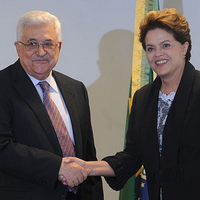On Dec. 3, 2010, with only 28 days left in office, Brazil's then-President Luiz Inacio Lula da Silva officially recognized the independent state of Palestine along Israel's pre-1967 borders. A spokesman for Israel's Foreign Ministry responded with a pointed reminder that Brazil had "never made any contribution" to the peace process, and called such unilateral declarations counterproductive. But that didn't keep Argentina from following suit within a matter of days, and Bolivia and Ecuador had joined the ranks by Christmas. Uruguay waited until the New Year to make a formal declaration, while Chile did so on Jan. 12. And on Jan. 15, Guyana joined its South American neighbors, becoming the seventh state in the region to recognize an independent Palestine since December. Paraguay and Peru are rumored to be next in line.
Credit -- or blame -- for starting the trend clearly goes to Brazil, which under Lula assembled a constituency of developing nations in Latin America, Africa, and the Middle East, all broadly supportive of Brazil's worldview. At every turn, Brazil's outreach was laced with an opportunism made possible by the shortcomings of U.S. foreign policy in addressing these countries' concerns. In many ways, Brazil has become America's alter ego in world affairs, "the Mac to the United States' PC," as Julia Sweig of the Council on Foreign Relations recently put it. This reading of Brazil's rise under Lula has become the dominant narrative for understanding the Dec. 3 declaration.
However, an alternative cipher for interpreting Lula's move warrants consideration. In 2009, Brazil elevated the status of its bilateral relationship with Iran to that of "new geographic partner." Brazil and Turkey subsequently worked in concert for more than a year to defuse tension over Iran's nuclear program -- to no avail: When a fuel swap deal negotiated among Brazil, Turkey and Iran in May 2010 was swiftly brushed aside by the U.N. Security Council in favor of a fourth round of U.S.-backed sanctions, Brazil suffered an international humiliation.

